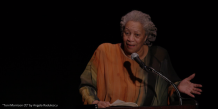
Reach by Mary https://oilpastelsbymary.com/
I think all creative people are extraordinary. You’re extraordinary. I’m extraordinary too. We’ve been extraordinary all our lives and one day at the age of six or eleven or twenty-one or fifty-seven something remarkable happened and we discovered we were, and then a corner was turned.
But a separate breed of outlier creator is so extraordinary and so driven and capable of such incredible creative feats and leads such an extreme existence of sacrifice that we wonder what there is about them that inspires them so. What sustains them and equips them so perfectly to produce such exceptional work? Theirs isn’t the only path to creative achievements—most creators lead more moderate lives. But it’s a path extraordinary creative outliers often choose.
Creative outliers are so absorbed in facing challenges and solving creative problems that they have almost no interest in anything else. Nobel Prize winner Saul Bellow—the premier American writer of the second half of the 20th century– said, “I have always put the requirements of what I was writing first—before jobs, before children, before any material or practical interest, and if I discover that anything interferes with what I’m doing, I chuck it. Perhaps this is foolish, but it has been the case with me.” He was married five times.
Novelist Jane Smiley wrote, “Even if my marriage is falling apart and my children are unhappy, there is still a part of me that says, ‘God! This is fascinating.’” Ernest Hemingway lived in poverty early in his career and sometimes stole food and said a writer’s perceptions are sharper when he’s “belly-empty, hollow hungry,” that “hunger is good discipline and you can  learn from it.” Before taking the literary world by storm late-blooming novelist/essayist Henry Miller lived in poverty too. He once said, “I have no money, no resources, no hope. I am the happiest man alive.” Emily Dickinson, the greatest American woman poet, author of 1,775 poems, said that if she felt physically as if the top of her head was taken off, she knew that was poetry. Ballerinas—artistes of artistes–may practice until their muscles scream and their feet bleed.
learn from it.” Before taking the literary world by storm late-blooming novelist/essayist Henry Miller lived in poverty too. He once said, “I have no money, no resources, no hope. I am the happiest man alive.” Emily Dickinson, the greatest American woman poet, author of 1,775 poems, said that if she felt physically as if the top of her head was taken off, she knew that was poetry. Ballerinas—artistes of artistes–may practice until their muscles scream and their feet bleed.
We look at these creative outliers and we marvel and are impressed or appalled or shocked, and often ask ourselves “Could I live an unusual life like  that? Am I willing to sacrifice so much for my art and suffer so much and risk so much? Is that possible for me? How much of my normal life am I willing to give up? If I sacrificed more could I be great too?” And ordinarily decide it isn’t possible at all and we’re not willing to sacrifice in that way, nor suffer, nor risk all that. We couldn’t because a life like theirs asks too much. We draw a line and dare not cross it.
that? Am I willing to sacrifice so much for my art and suffer so much and risk so much? Is that possible for me? How much of my normal life am I willing to give up? If I sacrificed more could I be great too?” And ordinarily decide it isn’t possible at all and we’re not willing to sacrifice in that way, nor suffer, nor risk all that. We couldn’t because a life like theirs asks too much. We draw a line and dare not cross it.
All creative people are obsessed to some extent or another, from mildly to ferociously, so much so that when we obsessed-but-less-obsessed creators hear about these outlier creators we have no problems understanding them since they’re only different from us in degree.
What humans in their craft can accomplish extraordinary outlier creators are willing to push themselves upward toward. They have a genius. They’re self-absorbed. They’re determined. They’re completely taken by a way that’s too demanding for the ordinary run of women and men. But for a select few like these outliers their craft becomes a way of life, a journey, a goal, an inevitable struggle of someone rare who’s capable of achieving the impossible.
Creative outliers pour themselves heart and soul and muscle and blood into their work. They work and they work and they work repetitively, and think  about their art or their writing, acting, or dancing continually, and have a monumental amount of confidence. Any time they’re not working they’re making plans for improvement because they know no matter how good you are and what you’ve accomplished you can always be better.
about their art or their writing, acting, or dancing continually, and have a monumental amount of confidence. Any time they’re not working they’re making plans for improvement because they know no matter how good you are and what you’ve accomplished you can always be better.
The fundamental role of all creators without exception is to create—to produce works–and they do with a vengeance. Pablo Picasso produced 50,000 works—1,885 paintings ,1,228 sculptures, 2,800 ceramics, 12,000 drawings, thousands of prints, and tapestries and rugs.
There wasn’t a moment of his waking day all his career that Nobel Prize dramatist Eugene O’Neill wasn’t thinking about writing. He produced 35 full-length plays and 17 one act plays and revolutionized American theater. Writing long hours, English novelist Charles Dickens—the most popular writer in the world at the time– would sometimes put his head into a bucket of cold water, dry his hair with a towel, and then go on writing.
Creative outliers learn—often at an early age–that they will achieve more if they concentrate their efforts in one area. They are aware only of the work before them, and let nothing divert them from it. French novelist Gustave Flaubert said that only writing mattered to him, and that he kept all his other passions locked up in a cage, visiting them now and then for diversion. He said too, “Sometimes I don’t understand why my arms don’t drop from my body with fatigue, why my brains don’t melt away. I am leading a stern existence, stripped of all external pleasure, and am sustained only by a kind of permanent rage, which sometimes makes me weep tears of impotence but which never abates.”
French novelist/poet/dramatist Victor Hugo started his day by handing his clothes to his servant with strict orders to return them only after Hugo had finished a day’s work of seven hours. Composer Igor Stravinsky and novelist Thomas Wolfe worked all their lives in a frenzy—Wolfe in a “wild ecstasy” at top speed, never hesitating for a word, as though he were taking dictation.
You can’t measure intensity and a person’s pure life force. But the energy pouring out of outliers like Vincent van Gogh would bowl you over. Van Gogh  worked furiously at a fever pitch, gathering up the colors as though with a shovel, throwing them on canvas with rage, globs of paint covering the length of the paint brush, sticking to his fingers. Goethe called such super-charged outliers “demoniacs”–people with a super-abundance of vitality, “something that escapes analysis, reason, and comprehension.” Goethe was aware of this power in himself.
worked furiously at a fever pitch, gathering up the colors as though with a shovel, throwing them on canvas with rage, globs of paint covering the length of the paint brush, sticking to his fingers. Goethe called such super-charged outliers “demoniacs”–people with a super-abundance of vitality, “something that escapes analysis, reason, and comprehension.” Goethe was aware of this power in himself.
Russian Anton Chekhov wrote 10,000 pages of short stories, and also produced great plays like The Cherry Orchard, The Seagull, and Uncle Vanya, and was a practicing physician too. Noted architect and futurist Buckminster Fuller was often unable to stop working until he dropped from exhaustion. Isaac Asimov, author or editor of more than 500 books, said he wrote for the same reason he breathed—because if he didn’t, he would die.
Extraordinary creative outliers are guided by an ambition, a notion so bold that it’s almost outlandish: that you’re born with a certain aptitude and with direction, discipline, and sacrifice you can transform yourself into something magnificent. Their focus is maniacal—all day long every day. When they’re away from their work they long for it.
Nobel novelist Toni Morrison said, “But the important thing is that I don’t do anything else. I avoid the social life normally associated with publishing. I  don’t go to cocktail parties. I don’t give or go to dinner parties. I need that time in the evening because I can do a tremendous amount of work then. And I can concentrate.” Outlier novelist Philip Roth said, “My schedule is absolutely my own. Usually, I write all day but if I want to go back to the studio in the evening, after dinner, I don’t have to sit in the living room because someone else has been alone all day. I don’t have to sit there and be entertaining or amusing. I go back out and I work for two or three more hours.” American William Faulkner said jokingly, “If a writer has to rob his mother, he will not hesitate: the ‘Ode on a Grecian Urn’ is worth any number of old ladies.”
don’t go to cocktail parties. I don’t give or go to dinner parties. I need that time in the evening because I can do a tremendous amount of work then. And I can concentrate.” Outlier novelist Philip Roth said, “My schedule is absolutely my own. Usually, I write all day but if I want to go back to the studio in the evening, after dinner, I don’t have to sit in the living room because someone else has been alone all day. I don’t have to sit there and be entertaining or amusing. I go back out and I work for two or three more hours.” American William Faulkner said jokingly, “If a writer has to rob his mother, he will not hesitate: the ‘Ode on a Grecian Urn’ is worth any number of old ladies.”
We live in a world where everyone is selling something. Everyone has an ulterior motive. They want to be a brand. But these outliers only want one goal: to reach the highest heights they can. That’s it. There’s nothing else.
You look at Picasso and Faulkner and say, “Oh, that’s why painting and writing were invented. As if the gods of the arts declared, ‘To show you others how it should be done we’re going to make a person to represent perfection’.”
They have bad days, difficulties, and setbacks, and still believe in themselves. Andre Gide said, “The great artist is one …for whom the obstacle is a springboard.” They know that effort is more important than talent. And if you say to them, “You’re just so gifted” they’ll stop you and say, “No, I’m no more talented than anyone else, no more talented than you, but I work much harder” and tell you and me, “If you want to excel you’ll have to overcome the notion that it’s easy.”
They’re a psychologically phenomenal combination of purity of focus and  purity of discipline and purity of energy. Their creative lives are both comfortable and disciplined. Even when they’re miserable they’re happy. Age has little effect on their skills except to improve them. They’re never happier and more at ease than when under pressure. They have a sense of being destined for something that very few other people are fitted for. But they are and they know they are.
purity of discipline and purity of energy. Their creative lives are both comfortable and disciplined. Even when they’re miserable they’re happy. Age has little effect on their skills except to improve them. They’re never happier and more at ease than when under pressure. They have a sense of being destined for something that very few other people are fitted for. But they are and they know they are.
They have a supreme care about their craft, and they never forget their failures. Their craft is their sanctuary. They’re never better than when doing their craft.
Outlier playwright George Bernard Shaw said, “I am of the opinion that my life  belongs to the whole community and as long as I live it is my privilege to do for it whatever I can. I want to be thoroughly used up when I die. For the harder I work the more I live. I rejoice in life for its own sake. Life is no brief candle to me. It’s a sort of splendid torch which I’ve got to hold up for the moment and I want to make it burn as brightly as possible…”
belongs to the whole community and as long as I live it is my privilege to do for it whatever I can. I want to be thoroughly used up when I die. For the harder I work the more I live. I rejoice in life for its own sake. Life is no brief candle to me. It’s a sort of splendid torch which I’ve got to hold up for the moment and I want to make it burn as brightly as possible…”
© 2016 David J. Rogers
For my interview from the international teleconference with Ben Dean about Fighting to Win, click on the following link:
Order Fighting to Win: Samurai Techniques for Your Work and Life eBook by David J. Rogers
or
Order Waging Business Warfare: Lessons From the Military Masters in Achieving Competitive Superiority
or


I do get this. I follow the dictate “I write therefore I am.” Another good and stimulating post 🙂
LikeLike
Peter, I’m glad you liked the post. I’m sure you find much satisfaction in your devotion to writing, as I do.
LikeLike
As you understand, its both a blessing and a curse, but we would have it no other way
LikeLiked by 1 person
A wonderful post that I got lost in, nodding and agreeing, “oh yes I can relate to this and that, and so on and so forth.” For me the fascinating part of creative art is the process, the learning and exploring, being able to focus on something so completely that the world around me dissolves with no recognition of time or people. There are times, a certain point during the creative process, when the connection is so strong with what I’m working on, that it can take me to a point of an “endorphin rush” – doesn’t happen every time, but when it does there is nothing like the elevated high from doing something that I love. Balancing this with my personal life is difficult, but is an essential element for keeping centered and fresh.
Thank you David this was a very interesting post. Thank you also for using one of my paintings in your post – the gesture means a lot!
LikeLike
Mary, I too relish that mood of total forgetfulness of everything but the work before me. The disappearance of time, troubles, obligations, or anything unrelated for me to the words and ideas there in my mind that I am setting out to unscramble. I too love the work. I adore words.
I think the reader comes into this post in a good mood that’s elevated by your lovely painting that begins the post. I’m glad you could find so much in the post. I enjoyed re-reading your bio and am so happy that you returned to art and are having such good results from it.
LikeLiked by 1 person
Thank you David, always appreciate your kind thoughts.
LikeLiked by 1 person
I enjoyed reading your post, David.
The last part I have founded so powerful:
“…life is not brief candle to me.It’s a sort
of splendid torch which I’ve got to
hold up for the moment and I want to
make it burn as brightly as possible…”
LikeLike
Hi Marilucas. I’m so glad you liked the post. I love that quote too. By the way, I see that you posted your comment more than once. Perhaps when you didn’t see it appear on the blog, you thought it didn’t go through. But it did. It’s just that I have to approve it in order for it to get posted on the blog. I’m glad you figured out how to comment on the blog and I appreciate your doing so.
LikeLike